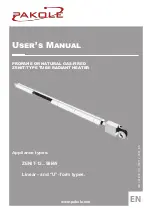
RESIDENTIAL GAS AND ELECTRIC WATER HEATER
SERVICE HANDBOOK
A.O. Smith Water Products Company
Training Department
©
2002
Ashland City, Tennessee
54
TECHNICAL BULLETIN
BULLETIN 23
CHLORINATION PROCEDURE
CAUSE
The chlorination procedure is used to eliminate various bacteria that
accumulate and grow in water heaters. These bacteria often cause odorous
or discolored water conditions.
PROCEDURE
Please read the steps of the chlorination procedure prior to beginning. If you
feel uncomfortable performing any of these steps, contact a service person to
perform this procedure for you.
STEP 1
Turn off the gas or electric supply to the tank.
STEP 2
Turn off the cold water supply valve to the tank.
STEP 3
Open a nearby hot water faucet to relieve the vacuum.
STEP 4
Drain all the water from the tank (a water-hose may be needed).
STEP 5
Remove the anode rod(s), and close the drain valve.
STEP 6
Using a funnel in the anode opening add one gallon of household chlorine
bleach (e.g. Clorox or Purex) for every 25 gallons of tank capacity.
STEP 7
Reinstall anode rod(s) after inspecting and replacing as needed.
STEP 8
Open cold water supply valve and refill the system. Then draw the water to
every hot water fixture, until the smell of chlorine is detected. Operate dish
and clothes washers until a noticeable amount of the chlorine is detected as
well.
All hot water lines must receive treatment.
STEP 9
Leave the chlorine solution undisturbed for one hour or more.
STEP 10
After the contact time has elapsed, drain the tank according to steps #2, #3, &
#4.
STEP 11
Close the drain valve and refill the tank. Allow the tank to sit for 15 minutes.
Repeat steps #2, #3, and #4. Continue to flush the tank if the water is
discolored or contains a chlorine odor.
STEP 12
Close the drain valve and refill the tank. Flush all chlorine from the piping by
opening every hot water outlet/ appliance.
STEP 13
Return hot water heating system to service by following the recommended
start-up procedure posted on the unit or in the manual.







































